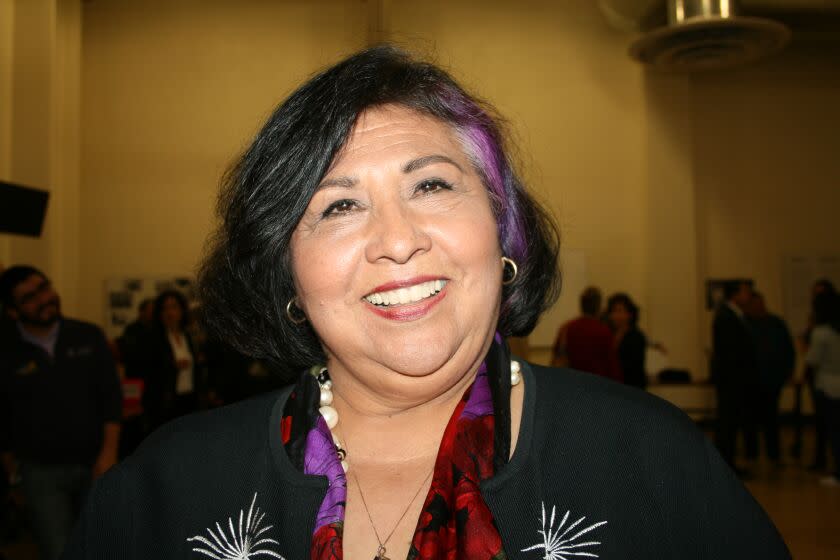Former L.A. County Supervisor Gloria Molina says she has terminal cancer

- Oops!Something went wrong.Please try again later.
Gloria Molina, a trailblazing politician who made history as the first Latina elected to the state Assembly, the Los Angeles City Council and the county Board of Supervisors, said Tuesday she is suffering from terminal cancer.
In a Facebook post, Molina, 74, wrote that the cancer, which she said she has been living with for three years, is "very aggressive." She said she is being treated at City of Hope, a cancer center, and said she feels fortunate to have lived a "long, fulfilling and beautiful life.”
"I'm really grateful for everyone in my life and proud of my family, career, mi gente, and the work we did on behalf of our community," Molina wrote in the post, adding that she has a daughter and one grandchild, with another one on the way. "I have an amazing and caring family, wonderful friends, and worked with committed colleagues and a loyal team."
Molina spent 23 years on the Board of Supervisors, where she represented the 1st District from 1991 to 2014. The district stretched from Koreatown, Pico-Union and East Los Angeles all the way east to Pomona and included much of the San Gabriel Valley.
Molina's friends and former colleagues called her a fighter, determined to bring more people who looked like her into the white- and male-dominated rooms of California politics.
"Gloria is a trailblazer," said Antonia Hernandez, the former longtime president of the Mexican American Legal Defense and Educational Fund. "Gloria was one of the earliest women to open doors for a whole bunch of other Latina women — not only in L.A., but in California."
Hernandez, who as a young lawyer met Molina in 1974, said Molina repeatedly urged Latinas to work in all levels of government. She said Molina was the one who urged her to go to Washington, D.C., and work for Sen. Edward M. Kennedy (D-Mass.).
"She was always calling. She was always saying there's an opportunity here," Hernandez recalled Tuesday. "She really nurtured a lot of folks to go into public service and politics."
Miguel Santana, chief executive of the Weingart Foundation, said he was inspired by Molina while in high school and worked for her for 13 years when she was a supervisor. He said Molina, whom he now counts as a close mentor and friend, always stuck out on the board as a tireless advocate for women and Latinas.
"She was always an activist in her way of governing," Santana recalled. "She was willing to take on any righteous cause."
Molina started her political life in the 1970s as an activist in the Chicano movement and advocate for Mexican American women who were sterilized against their will at Los Angeles County-USC Medical Center. Years later, she fought for the replacement of the hospital after an earthquake, accusing the white supervisors of racism after they said they wanted to see it rebuilt with a smaller footprint.
"It’s sad for me as someone who loves her and knows her to know that she’s transitioning in her life," Santana said. "But I also know that she’s incredibly grateful to have had the opportunity to fight on behalf of her community."
Colleagues said she made an indelible mark on Los Angeles County, particularly in East Los Angeles. As a state lawmaker, Molina was known for mobilizing her constituents to prevent a state prison from opening in a predominantly Latino part of her district that had been marred by freeways and other unwelcome projects.
She's also credited as a major force behind the creation of Grand Park, which stretches three blocks between City Hall and the Music Center.
Molina pushed city and county officials to create new parkland in downtown L.A. as part of the Grand Avenue redevelopment project, which brought two high-rises to a site across from Walt Disney Concert Hall. She also ensured that Grand Park was constructed before the towers were built.
Supervisor Hilda Solis, who succeeded Molina on the board, said she would introduce a motion next week to name Grand Park after Molina.
"Seeing her break these glass ceilings inspired me," Solis, who was the first Latina elected to the state Senate, said in a statement. "I remember dreaming of one day serving our community just as she did, with passion."
Near the end of her tenure on the Board of Supervisors, she urged voters to defeat Sheriff Lee Baca, who was running at the time for a fifth term, saying he had presided over "an extraordinary cascade of scandals that have exposed the dismal state of the department and the jails he runs."
A year later, she launched her own campaign to return to the City Council but was defeated by then-Councilmember Jose Huizar.
Times staff writer David Zahniser contributed to this report.
Updates:
10:36 a.m. March 15, 2023: This article was updated to clarify that Antonia Hernandez is the former president of the Mexican American Legal Defense and Educational Fund.
This story originally appeared in Los Angeles Times.

